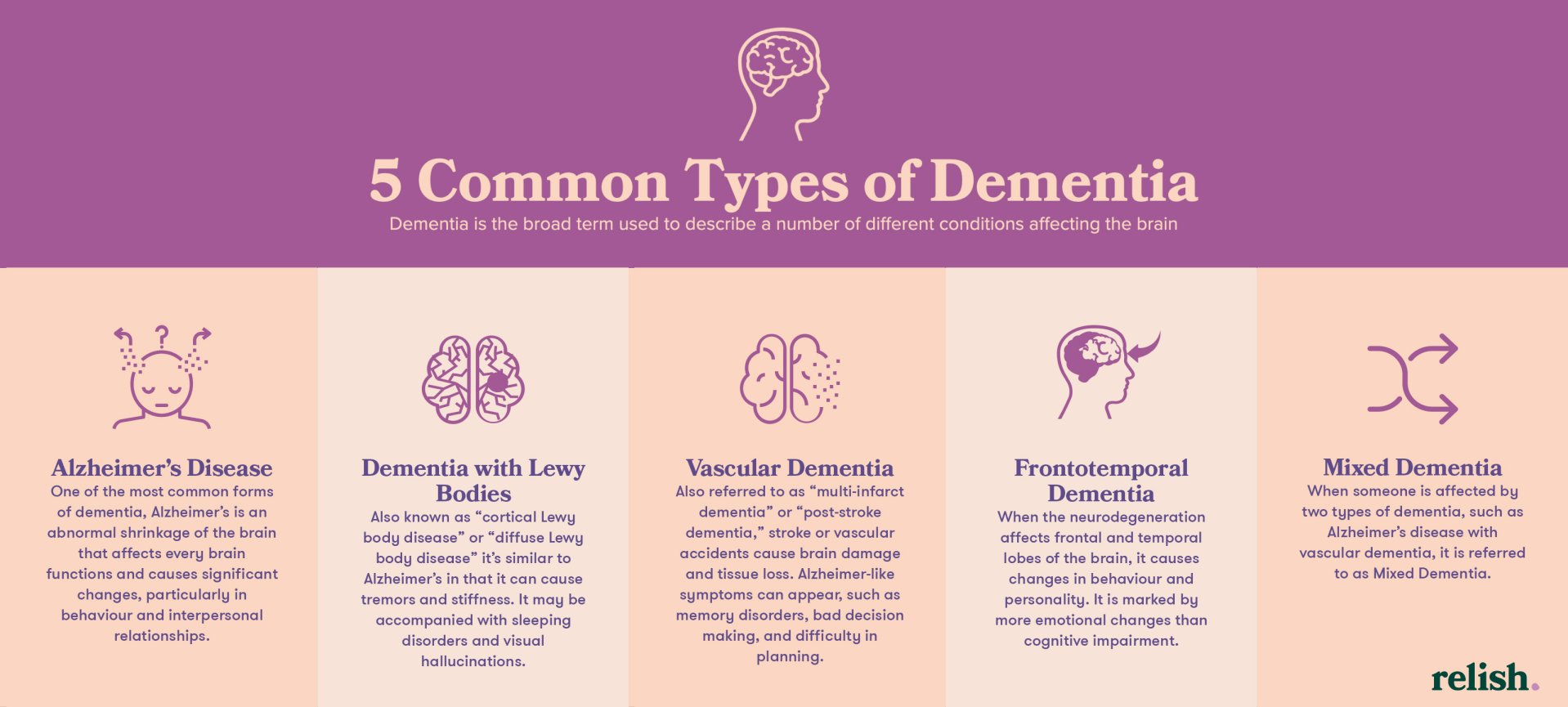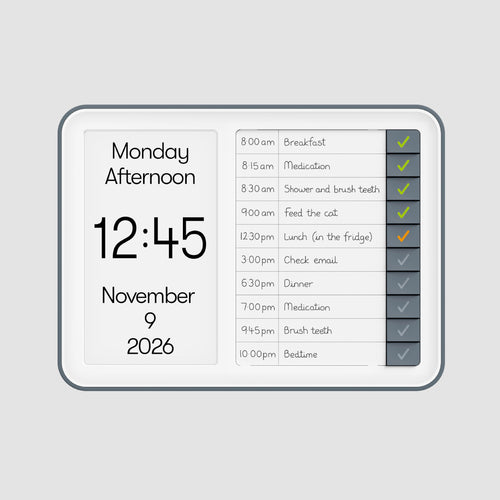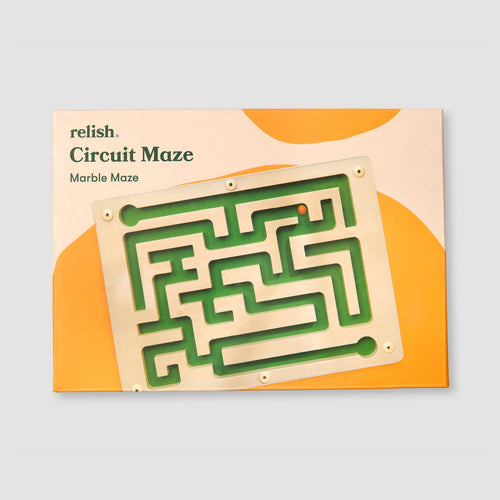There are several different types of dementia, each with its own signs and symptoms. While memory loss is often the most recognised, dementia can affect everything from language to movement to behaviour.
When you or someone you love is diagnosed, it’s natural to feel overwhelmed or unsure of what to expect. But learning more about the different types of dementia can help you feel better equipped and more confident in handling the future.
In this guide, we’ll walk you through five of the most common types of dementia, as well as some lesser-known ones. We’ll also share helpful information on how dementia is diagnosed and ways to support someone living with the condition.

What is Dementia?
Dementia is a general term used to describe a collection of symptoms that affect how the brain works. These symptoms might include memory loss, confusion, difficulty with language or changes in mood and behaviour. They can make everyday tasks feel much harder than they used to.
Dementia happens when brain cells become damaged, which affects how they communicate with one another. Over time, this can impact thinking, reasoning, and even physical abilities.
It’s also important to know that dementia isn’t a normal part of ageing. While it’s more common in older adults, not everyone will develop it. And because there are many different causes of dementia, understanding which type someone has can help with finding the right support and care.
Alzheimer’s Disease
Alzheimer’s is the most common type of dementia. It’s a progressive condition, which means symptoms usually begin slowly and worsen over time. At first, it often affects memory and thinking, but as it develops, it can also impact language, emotions, and physical ability.
In the early stages, you might notice small changes that don’t feel like much at first. Over time, they can become more noticeable and begin to affect daily life. Common symptoms include:
- Memory loss, such as forgetting recent events, names and faces
- Becoming repetitive, repeating questions or routine behaviours
- Losing items or regularly finding them in unusual places
- Problems communicating or finding the right words
- Getting confused about the time of day (also know as dyschronometria), disorientation or getting lost
- Difficulty handling complex tasks
- Some people may become anxious, low in mood or irritable
- Issues with coordination or motor skills
Alzheimer’s mainly affects people over 65, but it can also develop earlier. While there’s no cure, treatments like medication, daily routines, and supportive activities can help manage symptoms and improve quality of life.
Vascular Dementia
Vascular dementia is the second most common type of dementia and is caused by reduced blood flow to the brain, often as a result of a stroke, small vessel disease or damage to blood vessels over time. This lack of oxygen and nutrients can cause areas of the brain to become damaged.
Symptoms can vary depending on which part of the brain is affected. Unlike Alzheimer’s, memory loss may not be the first sign. People might instead experience:
-
Trouble concentrating or staying focused
-
Slower thinking and processing
-
Struggling to plan or organise everyday tasks
-
Mood changes, such as depression or irritability
-
Walking problems or unsteadiness
In some cases, symptoms can come on suddenly, especially after a stroke. In others, they may develop more gradually.
Many people with vascular dementia also have other health conditions like high blood pressure, diabetes or heart disease. Managing these conditions can help slow down the progression.
Although there’s no cure, support is available. Staying active, eating well, and making small lifestyle changes can help keep the brain healthier for longer.
Brain training puzzles and exercises can also help maintain and re-establish healthy connections in the brain.
Lewy Body Dementia
Lewy body dementia (LBD) is one of the less well-known types of dementia, but it’s actually quite common. It’s caused by abnormal protein deposits called Lewy bodies that build up in the brain and affect how it works, especially in areas that control thinking, movement and mood.
One of the key things that makes Lewy body dementia different is how symptoms can shift from day to day, or even hour to hour. Some common signs include:
-
Changes in alertness or attention (appearing drowsy or confused, then suddenly clear)
-
Visual hallucinations (seeing things that aren’t there)
-
Shuffling walk or movement difficulties, similar to Parkinson’s
-
Trouble sleeping or acting out dreams
- Slow thinking or difficulty with problem-solving
Because these symptoms can overlap with both Alzheimer’s and Parkinson’s, Lewy body dementia can be tricky to diagnose at first.
There’s currently no cure, but treatments and therapies can help manage symptoms. A calm environment, consistent routines and gentle reassurance can make a real difference for someone living with LBD.
Frontotemporal Dementia
Frontotemporal dementia (often shortened to FTD) affects the frontal and temporal lobes of the brain – the areas responsible for personality, behaviour, language and decision-making. It tends to appear earlier than other types of dementia, often affecting people in their 40s, 50s or early 60s.
Because it starts in parts of the brain that control social and emotional behaviour, the first signs aren’t usually memory-related. Instead, you might notice changes like:
-
Unusual or inappropriate behaviour
-
A lack of empathy or emotional awareness
-
Difficulty finding words or understanding speech
-
Repeating phrases or losing fluency in language
-
Reduced interest in hobbies or personal care
- Changes in eating habits (e.g. craving sweet foods)
Some people may become more withdrawn or impulsive, while others struggle with planning or judgment. These changes can be particularly distressing for loved ones, especially if the person seems unaware of how they’ve changed.
There’s no cure for FTD, but speech therapy, structured routines and emotional support can all help. Early diagnosis is especially important, as symptoms can sometimes be mistaken for depression or other mental health issues.
Mixed Dementia
Mixed dementia means that more than one type of dementia is present at the same time. The most common combination is Alzheimer’s disease and vascular dementia, but Lewy body dementia can also be involved.
Because it includes features of multiple conditions, the symptoms can vary quite a lot. Some people may experience memory loss and confusion, while others might struggle more with attention, movement or mood changes. Common signs include:
- Difficulty with memory and thinking
- Trouble concentrating or making decisions
- Slower processing or problem-solving
- Mood swings or changes in personality
- Walking difficulties or unsteadiness
It can be difficult to diagnose mixed dementia during life, as symptoms often overlap with other types. In fact, many people are only diagnosed with mixed dementia after brain scans or further investigation.
While there’s no specific treatment just for mixed dementia, doctors often focus on managing the symptoms of each individual type involved. Lifestyle changes, like regular exercise, eating well and keeping the brain active, can also play a big part in supporting someone’s wellbeing.
Other Types of Dementia
While Alzheimer’s, vascular dementia, Lewy body dementia, frontotemporal dementia and mixed dementia are the most common, there are other types worth knowing about. Some are rarer, but they can affect people in different ways and may need different kinds of support.
Here are a few you may come across:
-
Parkinson’s Disease Dementia
Some people with Parkinson’s develop dementia later in the illness, with symptoms like slowed thinking, memory issues, and visual hallucinations. Read more about the link between Parkinson’s and dementia here.
-
Huntington’s Disease
An inherited condition that causes changes in movement, mood and thinking. Dementia usually appears in the later stages.
-
Normal Pressure Hydrocephalus (NPH)
Caused by a build-up of fluid in the brain. Symptoms include walking difficulties, bladder problems and memory loss. It can sometimes be treated with surgery.
-
Posterior Cortical Atrophy (PCA)
A rare condition that affects visual processing. People may struggle with reading, judging distances or recognising objects.
-
Creutzfeldt-Jakob Disease (CJD)
A very rare and fast-progressing form of dementia caused by abnormal proteins called prions.
-
Korsakoff Syndrome
Often linked to long-term alcohol misuse and a severe lack of vitamin B1. It mainly affects memory.
-
Young-Onset Dementia
Dementia diagnosed before the age of 65. It can be especially hard for families as it affects people in the middle of their working or parenting lives.
-
Dementia in People with Down Syndrome
Individuals with Down syndrome are more likely to develop Alzheimer’s-type dementia, often at a younger age.
Diagnosing Different Types of Dementia
Getting the right diagnosis is an important first step in understanding what’s happening and how best to support someone living with dementia. Because symptoms can overlap between different types, a diagnosis can take time and often involves several steps.
Doctors will usually begin by asking about the person’s symptoms, medical history, and any changes in memory, mood, or behaviour. They may carry out:
-
Memory and thinking tests to assess attention, language, and problem-solving
-
Blood tests to rule out other causes (like vitamin deficiencies or thyroid issues)
-
Brain scans (such as MRI or CT) to check for changes in brain structure
-
Physical exams to look for any movement or coordination problems
In some cases, a referral to a specialist, like a neurologist or memory clinic, is needed for further assessment.
Although getting a diagnosis can feel overwhelming, it also opens the door to tailored support, treatment options, and planning ahead. And for many families, just having a name for what’s happening can bring a sense of clarity and relief.
Living With Dementia: Treatment & Management
While there’s currently no cure for dementia, there are many ways to manage symptoms and support quality of life for both the person living with dementia and those around them.
Doctors may prescribe medications to help with memory, mood or sleep. These won’t stop dementia from progressing, but they can make day-to-day life a little easier in the short term.
Some people also benefit from therapies like:
- Speech and language therapy to support communication
- Occupational therapy to make everyday tasks more manageable
- Cognitive stimulation to keep the brain active and engaged
Lifestyle changes can also make a big difference. Keeping active, eating well, staying socially connected and creating a calm, structured environment at home all help promote wellbeing.
Equally important is emotional support for both the individual and their carers. Support groups, memory cafes and dementia-friendly activities can provide comfort, routine and moments of joy and help to combat loneliness in those living with dementia.
Products that Can Help Support You Through Dementia
Throughout the dementia journey, there are plenty of dementia-friendly products that can help support wellbeing, independence and spark moments of joy.
- Dementia clocks are designed to support individuals experiencing memory loss or cognitive challenges by clearly displaying the time, day, date and even time of day. The Relish Day Hub goes one step further by providing task reminders throughout the day to help you stay on track.
- Music products for dementia help people access the joy and power of their favourite music. The Relish Radio and Music Player is simply designed and easy to use, giving music lovers back their independence!
- Those in the later stages of dementia may benefit from sensory toys for adults, such as the Fufuly Calming Cushion, which gently expands and contracts as you embrace it, promoting relaxation and calming anxiety.
Summary
Depending on the type of dementia a person has and whether they are in an early stage of the disease, there are brain training exercises that may reduce some symptoms. It can be helpful to know the different forms of dementia to identify possible interventions and support required.
If you or a loved one are experiencing dementia-like symptoms and would like to learn more about dementia and how to care for a loved one living with dementia, please visit our website for more information and explore our dementia-friendly product range.






















